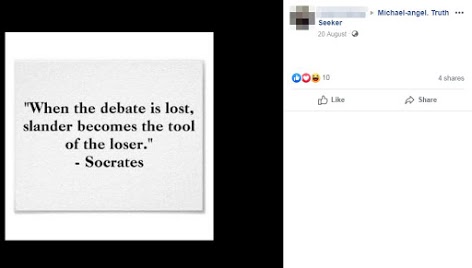The Statement
AAP FactCheck examined a Facebook post from August 20, 2019 that claimed to be a quote from ancient Greek philosopher Socrates.

The quote reads: “When the debate is lost, slander becomes the tool of the loser.”
The quote was posted by an Australian user to the group Michael-angel. Truth Seeker. The group’s aims are “Seeking Truth and Awareness in the areas of 5G, Anarchy, the Ruling Elite, Personal Sovereignty, OBE, Lucid Dreaming & NDE’s, Artificial Intelligence, Basic Universal Income, the Hero’s Journey, Psychedelics, Spirituality, Hidden History & Relationships”.
The post generated 10 reactions and four shares. The purported Socrates quote has been widely shared on Facebook, including the groups Mind Core which has more than 3.3 million followers and The Intellectualist, a society and culture page with more than 373,000 followers.
The Analysis
Socrates lived in Athens in the 5th century BC and was the first Greek philosopher to seriously explore questions of ethics. Born to a stonemason and a midwife, Socrates introduced the concept that “virtue is knowledge” but left no written records. Most of what survives was recorded by his student, the philosopher Plato, the historian Xenophon and Plato’s student, Aristotle, the philosopher and scientist.
Professor Rick Benitez from the University of Sydney’s Department of Philosophy and Department of Classics and Ancient History told AAP FactCheck in a statement the quote “does not appear in any of the direct evidence we have for Socrates”.
Prof Benitez said the quote was not found in the dialogues of Plato or the works of Xenophon that feature Socrates.
“It bears a vague resemblance to some things that Plato’s Socrates says in the Gorgias about the different methods of the philosopher and the rhetorician, but there is no direct reference to losing a debate, or to the losers using slander. There is only the general claim that philosophers use arguments and rhetoricians use persuasion (slander, not mentioned, being one technique of persuasion).”
Prof Benitez did a check of Plato’s uses of διαβολή (diabolē) and λοιδορία (loidoria) – the two most common Ancient Greek words for slander – and there was “nothing approaching” the purported quote in “anything Plato’s Socrates says”.
According to fact checking units Snopes, Politifact, Metabunk, Truth or Fiction, and CheckYourFact, the quote does not appear anywhere in Socrates’ speeches or writings. Truth or Fiction claimed the first iteration of the quote being attributed to Socrates was in May 2006 from a personal website. Another reference was found in April 2008 on the book review website, Goodreads.
The Verdict
Based on this evidence, AAP FactCheck found the attribution of the quote to Socrates to be false.
False – The Facebook post is false.
* AAP FactCheck is an accredited member of the International Fact-Checking Network. To keep up with our latest fact checks, follow us on Facebook, Twitter and Instagram.
First published August 22, 2019 15:12 AEST


















